Newsletter March 2015
 ICRH Global Newsletter ICRH Global Newsletter 31st of March, 2015
|
| PROJECTS |
INPAC
Six experts from China (Institute of Population Research, WHO Collaborating Center for Reproductive Health and Population Science at Peking University, Fudan University and Jiangsu Family Planning Research Institute) participated in the meeting to discuss problems encountered during the intervention implementation phase of the project. The main topics were compliance with the intervention protocol, difficulties of follow-up and data quality control. More information: Wei-Hong Zhang (weihong.zhang@ugent.be) and Shuchen Wang (shuchen.wang@ugent.be) |
| MOMI The 2nd Scientific Advisory Board Meeting of the MOMI project (Missed Opportunities in Maternal and Infant Health) at the FMUP, University of Porto, Portugal, 10th March 2015 |
MOMI Field visit to Kenya – Matuga sub-County (Kwale County), 27th to 29th January 2015
More information: Els Duysburgh (els.duysburgh@ugent.be) or Emilomo Ogbe (emilomo.ogbe@ugent.be) |
| EVENTS |
Millennium Development Goals Flemish development NGOs launch sensitization campaign on MDGs. The Millennium Development Goals expire this year, and in September decisions will be taken about a new set of goals for sustainable development. The Belgian coalition ‘2015 –time is running’ (2015-De Tijd Loopt) is taking action to sensitize politicians about the importance and the urgency of this issue. The actions include among Information on the actions and how to participate can be found at www.action2015.be (in Dutch). |
| ICRH PEOPLE |
Shu Zhou 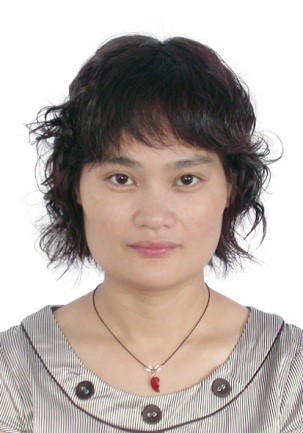 Dr. Shu Zhou is staying at ICRH Belgium for a one-year visiting scholarship. Dr. Shu Zhou is staying at ICRH Belgium for a one-year visiting scholarship.Dr. Shu Zhou is associated to the West China Second Hospital, Sichuan University, China where she works as physician and associated professor in the Department of Obstetrics and Gynaecology. She obtained her Ph.D in 2010 at Sichuan University. Her research focuses mainly on infection-associated inflammation of obstetric diseases. Until now, she has published more than 30 papers in national and international journals. Her research was funded by the Province Scientific Foundation of China. Dr. Shu Zhou was awarded a scholarship from the State Scholarship Fund of China Scholar-ship Council and will be working at ICRH for one year as a visiting scholar. Her study topic will be the comparison of epidemiology and management of maternal severe sepsis between Europe and China. More information: Shu Zhou, shu.zhou@ugent.be |
Stella Zhang
Stella holds a Master of Quantitative Analysis in Social Science form the Catholic University of Brussels and the Catholic University of Leuven, Belgium. She is a member of the advisory board of the Kunming AIDS Prevention and Control Bureau, supervisor of the Department of AIDS & STI in Kunming Women and Children Health Care Centre Co- Kunming Maternal and Child Health Hospital, and senior researcher of the Prevention HIV/Syphilis Mother to Child Transmission Project targeting migrant women, which is funded by Kunming Public Health Bureau. In 2014, she was awarded the “Women, Girls and HIV Investigator’s Prize” by the International AIDS Society and UNAIDS. The topic of Stella’s PhD research was ‘Vulnerabilities and opportunities for improving sexual and reproductive health and rights for adolescent female sex workers in Kunming, China’. Her supervisor was prof. dr. Stanley Luchters, her co-supervisor was prof. dr. Marleen Temmerman. |
Charlotte Warren
Charlotte is a pediatric and general nurse with a masters in primary health care from Bristol University. She has a lot of international experience working in emergency public health and humanitarian aid in Angola, Kosovo, Mozambique, Nicaragua, Rwanda, Sierra Leone, and Sudan. Between 2000 and 2012 she was based in the Population Council’s Kenya office, and currently she is Senior Associate MNH at Population Council (DC office). She was involved in many research projects and authored many scientific publications. The title of Charlotte’s PhD thesis was ‘Exploring the quality and effect of comprehensive postnatal care models in Eastern and Southern Africa’. Her supervisor was prof. dr. Marleen Temmerman. |
Anna Galle and Olena Ivanova in Mozambique
Anna and Olena arrived in March and will be staying in Mozambique for a 6-month research internship, following 6 months already spent with ICRH-B in Ghent. As well as getting firsthand experience of the highs and lows of field research, Anna and Olena will be assisting with data collection and management on several ICRH-M projects, and training ICRH-M staff in some areas of data management and analysis. They will also be making links with the Eduardo Mondlane University through the Desafio project. They are sure to go far, having already been on national television after Anna won a running competition in their first weekend! |
| PUBLICATIONS |
Characterizing concurrent partnerships in Cape Town, South Africa ICRH researchers, Roxanne Beauclair and Wim Delva, recently published the results of their study on concurrent partnerships in Cape Town. Concurrent partnerships have been suggested as a risk factor for transmitting HIV, but their impact on the epidemic depends upon how prevalent they are in populations, the average number of concurrent partnerships an individual has, and the length of time they overlap. However, estimates of prevalence of concurrent partnerships in Southern Africa vary widely, and the duration of overlap in these relationships is poorly documented. They set out to characterize concurrency in a more accurate and complete manner, using data from three disadvantaged communities of Cape Town, South Africa. They conducted a sexual behaviour survey (n=878) using Audio Computer-Assisted Self-Interviewing to collect sexual relationship histories on partners in the previous year. Using the beginning and end dates for the partnerships, they calculated the point prevalence, cumulative prevalence and incidence rate of concurrent partnerships, as well as the duration of overlap for relationships begun in the previous year. Linear and binomial regression models were used to quantify race and gender differences in the duration of overlap and relative risk of having concurrent partnerships in the past year. The results indicate that in this population the prevalence of concurrent partnerships is relatively high and is characterized by overlaps of long duration, implying there may be opportunities for HIV to be transmitted to concurrent partners. Read the paper in JIAS: http://www.jiasociety.org/index.php/jias/article/view/19372 More information: roxanne.beauclair@gmail.com Beauclair R, Hens N, Delva W. Concurrent partnerships in Cape Town, South Africa: race and sex differences in prevalence and duration of overlap. J Int AIDS Soc. 2015;18:19372. |
Improving adolescent sexual and reproductive health in Latin America Reflections from an International Congress in Cuenca, Ecuador, in February 2014. The international congress on Promoting Adolescent Sexual and Reproductive Health (ASRH) aimed to share evidence on effective ASRH intervention projects and programs in Latin America, and to link this evidence to ASRH policy and program development. Over 800 people participated in the three-day event and sixty-six presentations were presented. This paper summarizes the key points: 1. Context matters. Individual behaviors are strongly influenced by the social context in which they occur, through determinants at the individual, relational, family, community and societal levels. Gender norms/attitudes and ease of communication are two key determinants. 2. Innovative action. There is limited and patchy evidence of effective approaches to reach adolescents with the health interventions they need at scale. Yet, there exist several promising and innovative examples of providing comprehensive sexuality education through conventional approaches and using new media, improving access to health services, and reaching adolescents as well as families and community members using community-based interventions were presented at the Congress. 3. Better measurement. Evaluation designs and indicators chosen to measure the effect and impact of interventions are not always sensitive to subtle and incremental changes. This can create a gap between measured effectiveness and the impact perceived by the targeted populations. This Congress offered a starting point from which to build a multi-agency and multi-country effort to generate specific evidence on ASRH with the aim of guiding policy and program decision-making. In a region that contains substantial barriers of access to ASRH education and services, and some of the highest adolescent pregnancy rates in the world, the participants agreed that there is no time to lose. Kathya Córdova Pozo, Venkatraman Chandra-Mouli, Peter Decat, Erica Nelson, Sara De Meyer, Lina Jaruseviciene, Bernardo Vega, Zoyla Segura, Nancy Auquilla, Arnold Hagens, Dirk Van Braeckel, Kristien Michielsen. Improving adolescent sexual and reproductive health in Latin America: reflections from an International Congress. Reproductive Health 2015, 12:11 doi:10.1186/1742-4755-12-11. |
Forced an early marriage in Morocco Women’s perspectives on marriage and rights in Morocco: risk factors for forced and early marriage in the Marrakech region. Despite the introduction of the new Family Law, or Moudawana, in Morocco, effectively raising the minimum age for marriage, the number of girls being forced into wedlock is rising. This increase has been a source of concern from a women’s rights perspective. The present study explored women’s experiences and perspectives in relation to factors that contribute to the occurrence of child and forced marriage in Morocco. Using a participatory approach, focus-group discussions and in-depth interviews were held with women in both urban and rural settings in the greater Marrakech region. Overall, 125 women, between 18 and 69 years of age, participated in the study. Our findings highlight the need for more open dialogue between (grand) parents and children. Overall, the Moudawana is perceived as a considerable step forward for women’s rights, yet study findings show that current policy provisions are not effective in abolishing forced marriages. Findings point to the need for a redefinition of the role of organisations, women’s associations and other groups, with the recommendation that they focus their future efforts on awareness-raising among older generations and refrain from directly intervening in cases of forced marriage. Sensitisation efforts, including the use of popular media, are crucial to reach members of this older population group, where illiteracy remains widespread. Alexia Sabbe, Halima Oulami, Somia Hamzali, Najia Oulami, Fatima Zehra Le Hjir, Mariam Abdallaoui, Marleen Temmerman and Els Leye. Women’s perspectives on marriage and rights in Morocco: risk factors for forced and early marriage in the Marrakech region. Culture, Health & Sexuality, Volume 17, Issue 2, 2015. http://dx.doi.org/10.1080/13691058.2014.964773 |
Barriers to contraceptive methods uptake A qualitative study on barriers to modern contraceptive methods uptake among young women in Kenya. Young women in Kenya experience a higher risk of mistimed and unwanted pregnancy compared to older women. However, contraceptive use among youth remains low. Known barriers to uptake include side effects, access to commodities and partner approval. To inform a youth focussed behaviour change communication campaign, Population Services Kenya developed a qualitative study to better understand these barriers among young women. The study was carried out in Nyanza, Coast, and Central regions. Within these regions, urban or peri-urban districts were purposively selected based on having contraceptive prevalence rate close to the regional average and having a population with low socioeconomic profiles. In depth interviews were conducted with a sample of sexually active women aged 15–24, both users and non-users, that were drawn from randomly selected households. All the respondents in the study were familiar with modern methods of contraception and most could describe their general mechanisms of action. Condoms were not considered as contraception by many users. Contraception was also associated with promiscuity and straying. Fear of side effects and adverse reactions were a major barrier to use. The biggest fear was that a particular method would cause infertility. Many fears were based on myths and misconceptions. Young women learn about both true side effects and myths from their social networks. Findings from this research confirm that awareness and knowledge of contraception do not necessarily translate to use. The main barriers to modern contraceptive uptake among young women are myths and misconceptions. The findings stress the influence of social network approval on the use of family planning, beyond the individual’s beliefs. In such settings, family planning programming should engage with the wider community through mass and peer campaign strategies. As an outcome from this study, Population Services Kenya developed a mass media campaign to address key myths and misconceptions among youth. Rhoune Ochako, Mwende Mbondo, Stephen Aloo, Susan Kaimenyi, Rachel Thompson, Marleen Temmerman and Megan Kays. Barriers to modern contraceptive methods uptakeamong young women in Kenya: a qualitative study. BMC Public Health (2015) 15:118 DOI 10.1186/s12889-015-1483-1. |


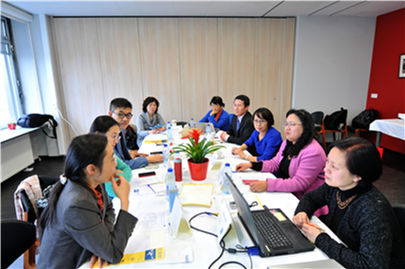 The Scientific Advisory Board (SAB) of the INPAC project (INtegrating Post-Abortion family planning services into existing abortion services in hospital settings in China) met in Gent 4 December 2014.
The Scientific Advisory Board (SAB) of the INPAC project (INtegrating Post-Abortion family planning services into existing abortion services in hospital settings in China) met in Gent 4 December 2014.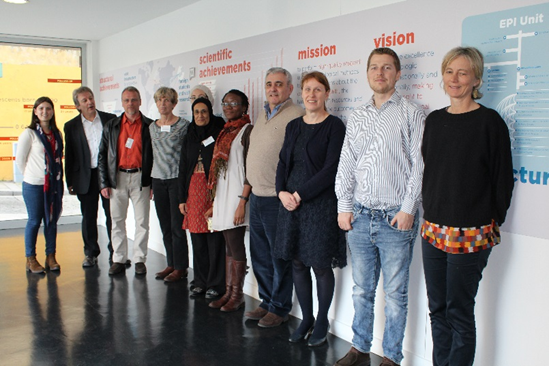 The meeting involved 5 Scientific Advisory Board Members (SAB) Albrecht Jahn from the University of Heidelberg, Germany; Sophie Alexander, University of Brussels, Belgium; Alexandre Dumont, Institut de Recherche pour le Développement, France; Zahida Qureshi, University of Nairobi, Kenya; Rosalind Raine, University College London, United Kingdom and MOMI Consortium members from University College London, ICRH-University of Ghent and the University of Porto, Portugal. There were discussions about the different evaluation frameworks and programme theory and best ways to develop the evaluation plan. Other key topics discussed included the challenges and successes of the interventions and the interim monitoring reports from the different study sites (Burkina Faso, Kenya, Malawi and Mozambique).
The meeting involved 5 Scientific Advisory Board Members (SAB) Albrecht Jahn from the University of Heidelberg, Germany; Sophie Alexander, University of Brussels, Belgium; Alexandre Dumont, Institut de Recherche pour le Développement, France; Zahida Qureshi, University of Nairobi, Kenya; Rosalind Raine, University College London, United Kingdom and MOMI Consortium members from University College London, ICRH-University of Ghent and the University of Porto, Portugal. There were discussions about the different evaluation frameworks and programme theory and best ways to develop the evaluation plan. Other key topics discussed included the challenges and successes of the interventions and the interim monitoring reports from the different study sites (Burkina Faso, Kenya, Malawi and Mozambique).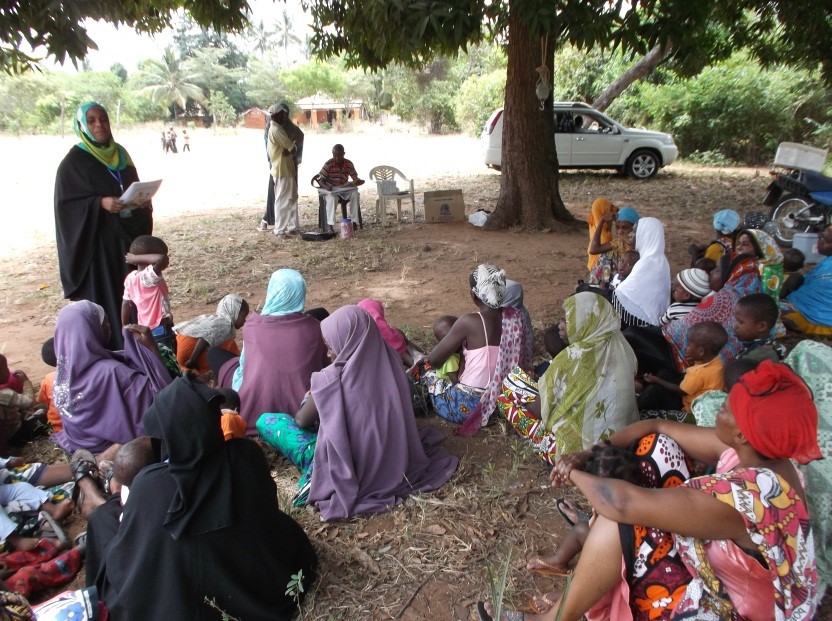
 others a petition campaign and a youth event in Bruges on Friday 8 May.
others a petition campaign and a youth event in Bruges on Friday 8 May. Xu-Dong (Stella) Zhang defended her PhD at Ghent University on 6 February 2015.
Xu-Dong (Stella) Zhang defended her PhD at Ghent University on 6 February 2015. Charlotte Warren defended het PhD at Ghent University on 13 February 2015.
Charlotte Warren defended het PhD at Ghent University on 13 February 2015.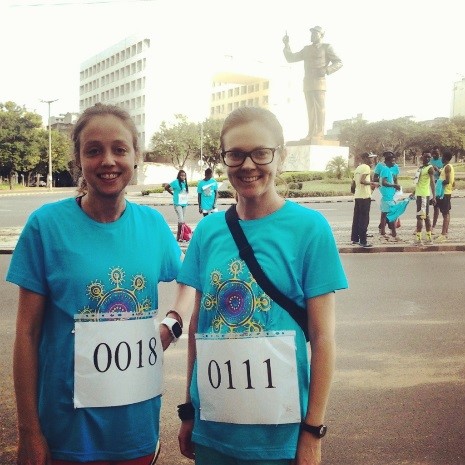 ICRH-M is very pleased to welcome two ICRH interns, Anna Galle and Olena Ivanova to Mozambique.
ICRH-M is very pleased to welcome two ICRH interns, Anna Galle and Olena Ivanova to Mozambique.